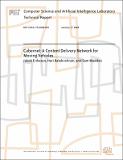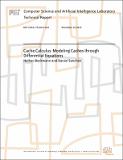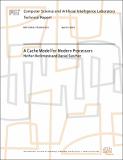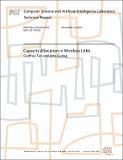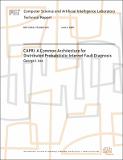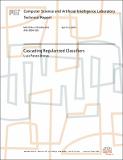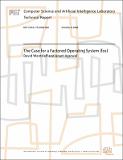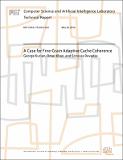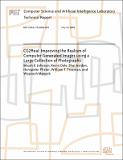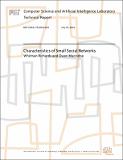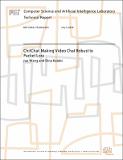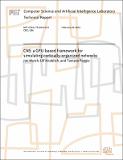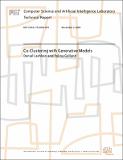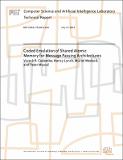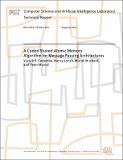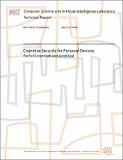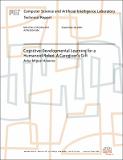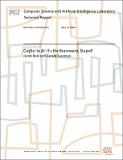Browsing CSAIL Technical Reports (July 1, 2003 - present) by Title
Now showing items 123-142 of 775
-
Cabernet: A Content Delivery Network for Moving Vehicles
(2008-01-17)This paper describes the design, implementation, and evaluation of Cabernet, a system to deliver data to and from moving vehicles using open 802.11 (WiFi) access points encountered opportunistically during travel. Network ... -
Cache Calculus: Modeling Caches through Differential Equations
(2015-12-19)Caches are critical to performance, yet their behavior is hard to understand and model. In particular, prior work does not provide closed-form solutions of cache performance, i.e. simple expressions for the miss rate of a ... -
A Cache Model for Modern Processors
(2015-04-09)Modern processors use high-performance cache replacement policies that outperform traditional alternatives like least-recently used (LRU). Unfortunately, current cache models use stack distances to predict LRU or its ... -
Can Basic ML Techniques Illuminate Rateless Erasure Codes?
(2004-05-05)The recently developed rateless erasure codes are a near-optimal channel coding technique that guaranteeslow overhead and fast decoding. The underlying theory, and current implementations, of thesecodes assume that a network ... -
Capacity Allocation in Wireless LANs
(2004-11-12)Today's access point based wireless LANs (WLANs) are inefficient and unfair. For many traffic loads they provide far less total throughput than they should, and do a poor job allocating what throughput they do deliver. ... -
CAPRI: A Common Architecture for Distributed Probabilistic Internet Fault Diagnosis
(2007-06-04)This thesis presents a new approach to root cause localization and fault diagnosis in the Internet based on a Common Architecture for Probabilistic Reasoning in the Internet (CAPRI) in which distributed, heterogeneous ... -
Cascading Regularized Classifiers
(2004-04-21)Among the various methods to combine classifiers, Boosting was originally thought as an stratagem to cascade pairs of classifiers through their disagreement. I recover the same idea from the work of Niyogi et al. to show ... -
The Case for a Factored Operating System (fos)
(2008-10-08)The next decade will afford us computer chips with 1,000 - 10,000 cores on a single piece of silicon. Contemporary operating systems have been designed to operate on a single core or small number of cores and hence are not ... -
A Case for Fine-Grain Adaptive Cache Coherence
(2012-05-22)As transistor density continues to grow geometrically, processor manufacturers are already able to place a hundred cores on a chip (e.g., Tilera TILE-Gx 100), with massive multicore chips on the horizon. Programmers now ... -
CG2Real: Improving the Realism of Computer Generated Images using a Large Collection of Photographs
(2009-07-15)Computer Graphics (CG) has achieved a high level of realism, producing strikingly vivid images. This realism, however, comes at the cost of long and often expensive manual modeling, and most often humans can still distinguish ... -
Characteristics of Small Social Networks
(2010-07-27)Two dozen networks are analyzed using three parameters that attempt to capture important properties of social networks: leadership L, member bonding B, and diversity of expertise D. The first two of these parameters have ... -
ChitChat: Making Video Chat Robust to Packet Loss
(2010-07-05)Video chat is increasingly popular among Internet users. Often, however, chatting sessions suffer from packet loss, which causes video outage and poor quality. Existing solutions however are unsatisfying. Retransmissions ... -
Cicada: Predictive Guarantees for Cloud Network Bandwidth
(2014-03-24)In cloud-computing systems, network-bandwidth guarantees have been shown to improve predictability of application performance and cost. Most previous work on cloud-bandwidth guarantees has assumed that cloud tenants know ... -
CNS: a GPU-based framework for simulating cortically-organized networks
(2010-02-26)Computational models whose organization is inspired by the cortex are increasing in both number and popularity. Current instances of such models include convolutional networks, HMAX, Hierarchical Temporal Memory, and deep ... -
Co-Clustering with Generative Models
(2009-11-03)In this paper, we present a generative model for co-clustering and develop algorithms based on the mean field approximation for the corresponding modeling problem. These algorithms can be viewed as generalizations of the ... -
Coded Emulation of Shared Atomic Memory for Message Passing Architectures
(2013-07-17)This paper considers the communication and storage costs of emulating atomic (linearizable) read/write shared memory in distributed message-passing systems. We analyze the costs of previously-proposed algorithms by Attiya, ... -
A Coded Shared Atomic Memory Algorithm for Message Passing Architectures
(2014-08-01)This paper considers the communication and storage costs of emulating atomic (linearizable) multi-writer multi-reader shared memory in distributed message-passing systems. The paper contains three main contributions: (1) ... -
Cognitive Security for Personal Devices
(2008-03-17)Humans should be able to think of computers as extensions of their body, as craftsmen do with their tools. Current security models, however, are too unlike those used in human minds---for example, computers authenticate ... -
Cognitive-Developmental Learning for a Humanoid Robot: A Caregiver's Gift
(2004-09-26)The goal of this work is to build a cognitive system for the humanoid robot, Cog, that exploits human caregivers as catalysts to perceive and learn about actions, objects, scenes, people, and the robot itself. This thesis ... -
CogSci to AI: It's the Brainware, Stupid!
(2006-03)Current modularization techniques fail when applied to hard AI problems.But cognitive science shows that the mind has modules specialized for particular functions.Unlike current engineered modules, the modules of themind ...

